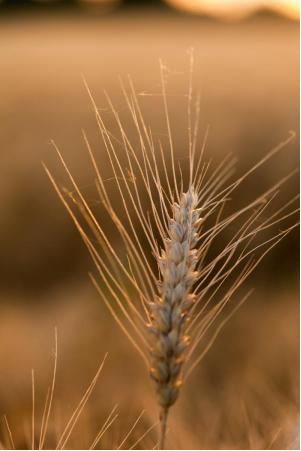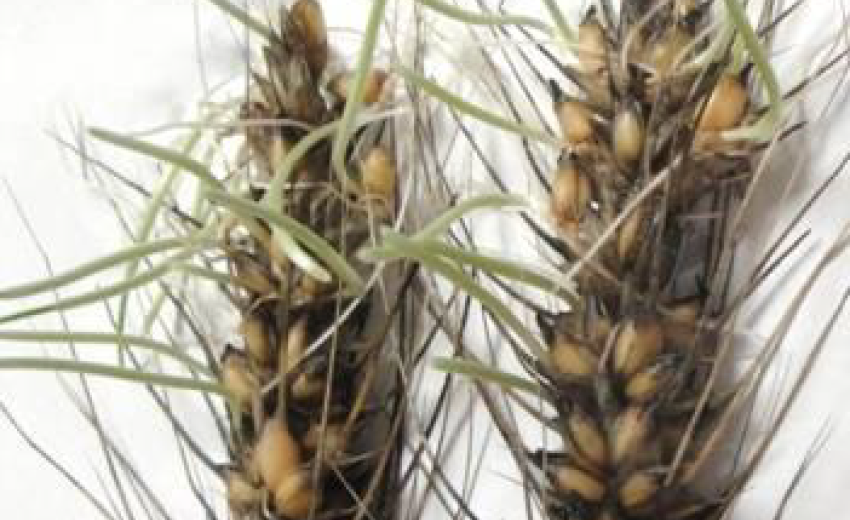Epigenetic factors identified as key to preventing loss of wheat caused by rain and high humidity (and should lead to better beer too)
 |
| Sprouted spike of wheat Courtsey: Harpinder Randhawa |
But now, findings by a McGill team suggest that the solution may lie not with genetics alone, but rather with a combination of genetic and epigenetic factors. The team, led by Prof. Jaswinder Singh of McGill’s Department of Plant Science, has identified a key gene that acts as a switch to determine how a particular plant will respond to high humidity and excess rainfall by either germinating early (PHS) or not. This switch is to be found in a key gene, ARGONAUTE4_9, in the “RNA dependent DNA Methylation” pathway (RdDM).
“The complex RdDM machinery is composed of several proteins that guide the genome in response to growth, developmental and stress signals. It’s a bit like the plant’s brain,” says Singh. “Although in the past scientists have identified it as the pathway that regulates the way a variety of genes are expressed, until now no one had made the link with PHS.”
The McGill team made the discovery by using a variety of genomic and molecular tools to identify specific ARGONAUTE4_9 genes, and then compare the way that these genes are expressed in PHS resistant versus PHS susceptible varieties of wheat.
“This discovery is important for other cereals like barley as well as for wheat,” said Surinder Singh, a Ph.D. student and one of the authors of this study, currently working in Professor Singh’s laboratory. “This means that not only should we be able to avoid the ugly bread and sticky crumbs produced by PHS wheat in future, we should also end up with better beer. “
The research opens up a whole new area of exploration for scientists as they try to increase the yields of wheat and decrease losses due to excessively humid conditions. It should also save farmers and governments around the world significant amounts of money in the future.
The study, “Polymorphic homoeolog of key gene of RdDM pathway, ARGONAUTE4_9 class is associated with Pre-harvest Sprouting in wheat (Triticum aestivum L.)” was just published in the journal “PLOS ONE”. To read the full article: http://dx.plos.org/10.1371/journal.pone.0077009
The research was funded by the Natural Sciences and Engineering Research Council of Canada (NSERC). To contact the researcher directly: [email protected]
Contact:
Katherine Gombay
Media Relations
McGill University
514-398-2189
http://www.mcgill.ca/newsroom/
http://twitter.com/McGillU
---------------------------------
Related Article:Study finds PHS gene that prevents wheat from sprouting
http://phys.org/news/2013-08-phs-gene-wheat.html#inlRlv
Provided by Kansas State University
 |
| Preharvest sprouting can cause significant losses in wheat crops, particularly in white wheat crops. Credit: Kansas State University |
Researchers at Kansas State University and the U.S. Department of Agriculture-Agricultural Research Service, or USDA-ARS, found and cloned a gene in wheat named PHS that prevents the plant from preharvest sprouting. Preharvest sprouting happens when significant rain causes the wheat grain to germinate before harvest and results in significant crop losses.
"This is great news because preharvest sprouting is a very difficult trait for wheat breeders to handle through breeding alone," said Bikram Gill, university distinguished professor of plant pathology and director of the Wheat Genetics Resource Center. "With this study, they will have a gene marker to expedite the breeding of wheat that will not have this problem."
Gill conducted the study with Guihau Bai, a researcher with the Hard Winter Wheat Genetics Research Unit of the USDA-ARS, adjunct professor of agronomy at Kansas State University and the study's lead author. Also involved were Harold Trick, professor of plant pathology; Shubing Liu, research associate in agronomy; Sunish Sehgal, senior scientist in plant pathology; Jiarui Li, research assistant professor; and Meng Lin, doctoral student in agronomy, all from Kansas State University; and Jianming Yu, Iowa State University.
Their study, "Cloning and Characterization of a Critical Regulator for Pre-Harvest Sprouting in Wheat," appears in a recent issue of the scientific journal Genetics.
The finding will to be most beneficial to white wheat production, which loses $1 billion annually to preharvest sprouting, according to Gill.
He said consumers prefer white wheat to the predominant red wheat because white wheat lacks the more bitter flavor associated with red wheat. Millers also prefer white wheat to red because it produces more flour when ground. The problem is that white wheat is very susceptible to preharvest sprouting.
"There has been demand for white wheat in Kansas for more than 30 years," Gill said. "The very first year white wheat was grown in the state, though, there was rain in June and then there was preharvest sprouting and a significant loss. The white wheat industry has not recovered since and has been hesitant to try again. I think that this gene is a big step toward establishing a white wheat industry in Kansas."
Gill said identifying the PHS gene creates a greater assurance before planting a crop that it will be resistant to preharvest sprouting once it grows a year later. Wheat breeders can now bring a small tissue sample of a wheat plant into a lab and test whether it has the preharvest sprouting resistance gene rather than finding out once the crop grows.
Much of the work to isolate the PHS gene came from Gill and his colleagues' efforts to fully sequence the genome—think genetic blueprint—of common wheat. Wheat is the only major food plant not to have its genome sequenced. The genome of wheat is nearly three times the size of the human genome.
Researchers were able to study sequenced segments of the common wheat genome and look for a naturally occurring resistance gene. Gill said without the sequenced segments, finding the PHS gene would have been impossible.
Explore further: Scientists help deliver genetic one-two blow to deadly wheat disease
